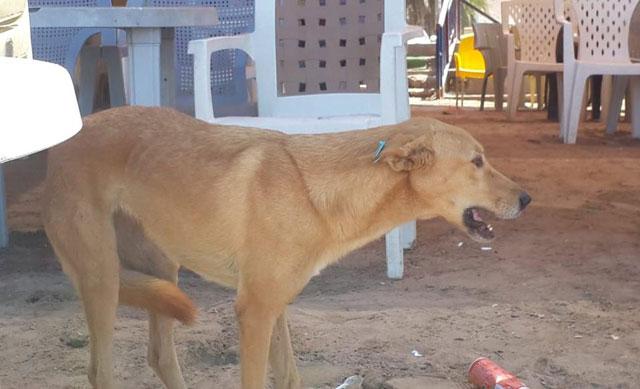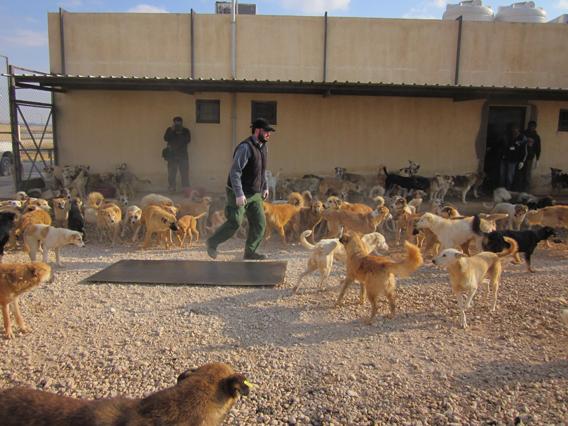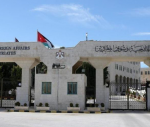You are here
Activists condemn ‘inhumane’ dog killings, call for GAM style programme
By Renad Aljadid - Dec 30,2018 - Last updated at Dec 30,2018

Under the Greater Amman Municipality’s sterilisation programme, captured stray dogs undergo neutering and vaccination before being released back onto the streets (Photo courtesy of Hazem Yacoub)
AMMAN — The Greater Amman Municipality (GAM) is continuing to implement its Animal Birth Control (ABC) Programme to control the increasing population of stray dogs, a GAM official said on Sunday.
Under the programme, captured stray dogs are neutered, vaccinated and then labelled with an ear tag to notify people that they have been sterilised, according to Shtoura Al Adwan, director of the GAM’s animal welfare department.
The step was welcomed by animal rights activists as “a long-awaited procedure”, which should replace the “inhumane” practice of poisoning and shooting stray dogs. However, they said that they were still concerned over the situation of stray animals in governorates other than Amman.
Khaleda Khatatneh, an animal rights advocate, claimed that hundreds of dogs were recently shot by citizens in the South Mazar and Moab areas of Karak Governorate, “with the approval and knowledge of the municipality”.
“Citizens keep complaining of stray dogs, which have no fault but trying to find food,” she told The Jordan Times, charging that reports of dog attacks only occur because people abuse them.
“Sterilisation is the only solution. These are living souls that have rights just like people do,” Khatatneh said.
Eman Hamdan (known as Umm Ali), who is the head of a national animal welfare campaign, cited the killing of dogs in Irbid through poisoning, while Mohammad Shatat, an animal welfare activist with Umm Ali’s campaign, expressed his rejection of the practice.
Umm Ali criticised the poisonings as “inhumane practices” by some municipalities, and criticised them for being “ineffective” in spreading awareness among people and children who harm animals.
“I have a farm that is dedicated for animals that need shelter, and for puppies whose mothers were killed, and many of them are found with broken bones and bloody injuries,” she noted.
Hamdan added that also she established a donkey farm, which she said is the first of its kind in the Kingdom as donkeys also undergo cases of abuse.
Hazem Yacoub, an animal rights activist at the Al Kanaany group, agreed that the ABC Programme is the most effective and humane procedure to deal with the population of stray dogs and cats in the country.
“The sterilisation helps in keeping animals in their territories, so that other dogs do not come, while also ensuring their safety from people and controlling their numbers,” Yacoub told The Jordan Times, stressing the importance of raising awareness among people who might still harass dogs even after sterilisation.
Umm Ali called on the municipality to ensure the mobilisation of specialised vehicles with trained staff to transfer animals from their locations and then return them back, while using clean and sterile tools.
The GAM’s official stressed that the municipality in Amman never used poison to control the numbers of stray dogs, but they do not control what takes place in other governorates or the individual killings that may take place elsewhere.
“Some groups of people are still not aware of sterilisation and demand killing the animals, so we keep on spreading awareness through the various media channels,” Adwan said, adding that the municipality has specialised personnel to deal with stray dogs through field visits, in addition to responding to complaints from citizens.
In a statement on its website, the GAM called on citizens to contact the following numbers to report cases of stray dogs: West Amman: 0778524505/064881637/064895123/064881639/064896048/064891682 East Amman: 065528783/064750321
Related Articles
AMMAN — With over 800 stray dogs culled over the past eight months in Madaba Governorate alone, animal welfare activists urged municipalitie
AMMAN — The Greater Amman Municipality (GAM) is committed to preventing animal cruelty and controlling the population of stray dogs through
AMMAN — Aqaba’s Al Rabee Society for Nature and Animal Protection, the first shelter in Jordan for lost, stray and abandoned dogs, recently

















